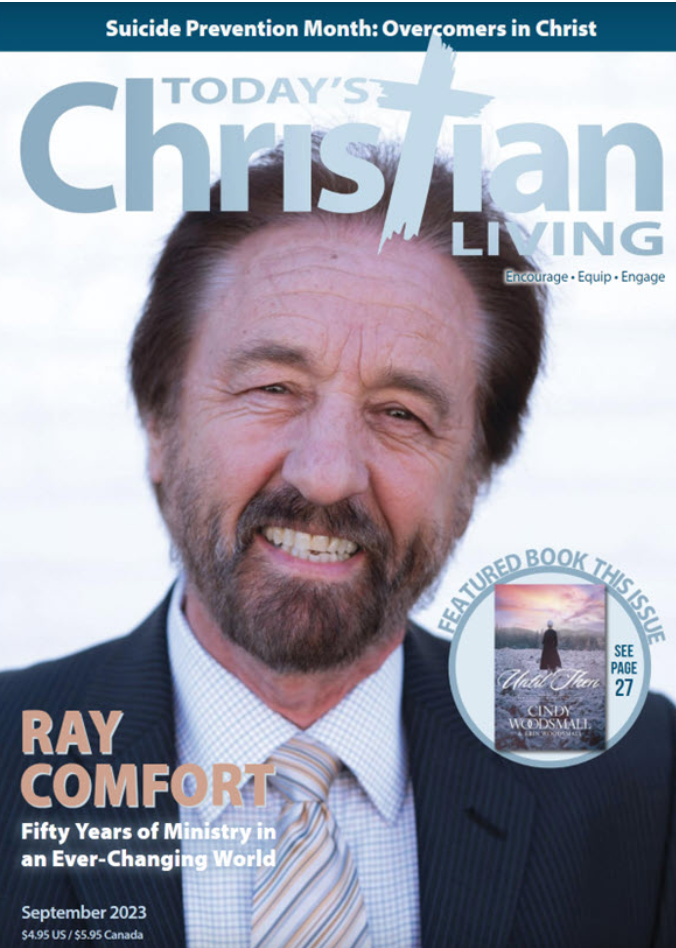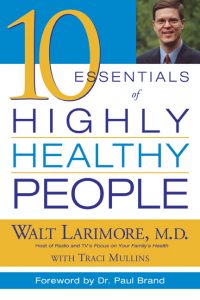
Apple a Day 004 – Tips on drug cost savings programs
September 22, 2023
Question: Does acupuncture have any medical benefit?
September 27, 2023In past programs we’ve discussed how your spiritual health, or lack thereof, can improve or detract from your physical, relational, and emotional/mental health. Just as we each need healthful habits to be physically healthy, what habits or disciplines can we consider to improve our spiritual health? We’ll talk about some on this edition of Ask Dr. Walt.
From 2021-2022, I was honored to host a TV show on LiftableTV, “Ask Dr. Walt.”
In past programs we’ve discussed how your spiritual health, or lack thereof, can improve or detract from your physical, relational, and emotional/mental health. Just as we each need healthful habits to be physically healthy, what habits or disciplines can we consider to improve our spiritual health? We’ll talk about some on this edition of Ask Dr. Walt.
You can click below to watch a video of the show, or I’ve put the show transcript at the end of the blog if you’d prefer.
CLICK TO LEARN MORE about FIT OVER 50 or 10 ESSENTIALS OF HIGHLY HEALTHY PEOPLE
Disclaimer: The Ask Dr. Walt show is designed for entertainment purposes to give information on various medical conditions, treatments, and procedures for your personal knowledge and to help you be a more informed consumer of medical and health services.
SHOW TRANSCRIPT
TEASE:
In past programs we’ve discussed how your spiritual health, or lack thereof, can improve or detract from your physical, relational, and emotional/mental health. Just as we each need healthful habits to be physically healthy, what habits or disciplines can we consider to improve our spiritual health? We’ll talk about some on this edition of Ask Dr. Walt.
OPEN:
Hi, everyone. I’m family physician Dr. Walt Larimore. Thanks for joining me for what I hope will be a very helpful and fruitful program. As we’ve discussed in multiple shows, without a deliberate effort to move, and exercise, and strengthen and nourish our fleshly bodies, we can become fat, out of shape, get sick more often, and die prematurely.
For those who are not in good shape physically, being forced to compete in a road race would likely leave you embarrassed and among the final finishers if you finished at all. In the same way, ignoring our spiritual health makes us spiritually flabby with weak moral muscles and weakened characters.
Of course, the opposite is also true. If we improve our physical health, strength, flexibility, and nutrition, we live a life with the potential for greater quality and quantity. We become stronger, healthier, and more capable. In the same way, if we pursue spiritual nutrition and training, we are better able to resist temptation, and we are equipped to win spiritual warfare and resist Satan.
I like to use the terms spiritual strength training and spiritual nutrition to refer to those regular spiritual practices that benefit not only our spiritual health, but our whole health and our lives. These are activities or disciplines that can produce not just spiritual health, but also physical, emotional, and relational health.
Pastor John Ortberg says, “Practices such as reading Scripture and praying are important—not because they prove how spiritual we are—but because God can use them to lead us into life.”[i] Although the Bible has no comprehensive “spiritual training list” that followers of Jesus should practice, it does command us to do certain things regularly.
My experience is that these disciplines produce abundant fruit. Like all my health tips for you, the key is to start small and make new healthful habits one at a time. Here are a dozen to consider—some of which we’ve discussed in more depth in the past, but my hope and prayer is that this short review will be both meaningful and helpful for you. Let’s go through them by beginning each one with a question or comment you guys sent to me:
1) Our first is from Beth in Independence, Missouri: “Dr. Walt, my most vital spiritual discipline is reading and chewing on God’s love letter to me, the Bible.”
Beth, I agree. I think that after becoming a follower of Jesus, the first spiritual discipline that I’d recommend is the Reading, studying, memorizing, and meditating on God’s Word. When I first decided to follow Jesus as a college student, the man who introduced me to a personal relationship with God through Christ gave me the assignment of reading a little bit what he called “God’s Love Letter to Us,” the Bible, each morning. I asked him where to start. He said to begin reading in John each day. I was confused and didn’t know much about the Bible, so I asked him, “Why do I have to read the Bible in the bathroom.” He smiled kindly and said, “Walt, start reading in the Book of John, not sitting on the john.”
God’s Word is the foundation of our lives. Any follower of Jesus who wants to seek first the Kingdom of God and His righteousness, a command Jesus gave us in Matthew 6:33, needs to be immersed in God’s word. God, has our Creator, has created a manual for the care and feeding of our physical, emotional, relational, and spiritual health. It’s the Bible. In the Scriptures, God reveals Himself and His will for us. If we want to know and enjoy God, the place to begin is God’s Word which is the most powerful and reliable way He speaks to His people. We’ve listed just a few verses that support this foundational discipline: Joshua 1:8; Jeremiah 15:16; Psalm 1:1-2; Psalm 119:11-16; Romans 1:16; Ephesians 6:17; 2 Timothy 3:16; and Hebrews 4:12.
2) Our second comment comes from Virgil in Clovis, California: “Dr. Walt, it’s been life-giving for me to practice the three spiritual disciplines found in 1 Thessalonians 5:16-18. The Bible tells us that these are God’s will for us to do daily.”
I like this one also, Virgil. For those of you who have not memorized it, Paul writes, “Rejoice always, pray continually, give thanks in all circumstances; for this is God’s will for you in Christ Jesus” (1 Thessalonians 5:16-18). Each of these activities involves talking to God, which is all that prayer is. And it’s to be done throughout the day, every day. Now, that does not mean every minute of every day. The Greek word translated “without ceasing” doesn’t mean “nonstop.” It means “constantly recurring” or “regularly.” In other words, we can punctuate our everyday moments with intervals of recurring prayer. I like to think of these first two disciplines as a form spiritual breathing. We breathe in God’s Word, and we breathe out our prayers of confession, adoration, thanksgiving, and supplication or requests. My wife, Barb, is a cat lover. She calls this form of prayer, CATS prayer, meaning starting with confession, followed by adoration, thanksgiving, and finally supplication. Of course, you don’t have to do all four forms of prayer with each prayer—but repetitively expressing your joy and thanks to God throughout each day is a wonderful discipline. Here’s a list of a few verses that support this discipline: Psalm 100:4; Romans 8:28; Philippians 4:6; Hebrews 4:16; and 1 Peter 5:6-7.
3) My third recommend spiritual discipline was suggested by several of you, including Cora in Iowa City, Iowa, who wrote, “To receive from the Lord, you must give and give generously to His church and His people.”
Cora, I bet you were watching our last program on healthful attitudes. In that show I discussed that people who become highly healthy always are committed to the practice of Giving generously of your treasure, time, and talent. Paul writes in Second Corinthians 9:6, “Remember this: Whoever sows sparingly will also reap sparingly, and whoever sows generously will also reap generously” (2 Corinthians 9:6). Research suggests those who give generously are happier,[ii] healthier,[iii] less stressed,[iv] less anxious,[v] and live longer.[vi] A 1944 newspaper column is credited with first observing: “You make a living by what you get. You make a life by what you give.”[vii] My family and I have experienced that truth and have found that while our giving blesses others, it delights us. No wonder the Bible says, “Each of you should give what you have decided in your heart to give, not reluctantly or under compulsion, for God loves a cheerful giver. And God is able to bless you abundantly, so that in all things at all times, having all that you need, you will abound in every good work” (2 Corinthians 9:7-8). Other verses that support this discipline are listed on the screen: Proverbs 11:24; 19:17; Matthew 23:11; Mark 9:35; Mark 10:43-44; Luke 6:38; Acts 20:35; Colossians 3:23-24; 1 Timothy 6:17-18; and 1 Peter 4:10.
4) My fourth suggested spiritual discipline was recommended by Laverne from, Perth Amboy, New Jersey, “I didn’t start regularly fasting until after being a Christian for many years. It has been an amazing blessing.”
My spiritual walk has been like yours Laverne, and I highly recommend Fasting which has been part and parcel of the Judeo-Christian tradition for millennia. Scripture is replete with examples of people who fast for a variety of reasons. Fasting is an opportunity to lay down an appetite—an appetite for food, for media, for shopping. This act of self-denial may not seem huge—it’s just a meal or a trip to the mall—but it brings us face to face with the hunger at the core of our being. Fasting exposes how we try to keep empty hunger at bay and gain a sense of well-being by devouring creature comforts. Through self-denial we begin to recognize what controls us. Our small denials of the self will show us just how little taste we have for sacrifice or time with God. Fasting reminds us that we care about “soul” things. We care about the church. We care about the world. We care about doing God’s will. Thus, we willingly set aside a little comfort so we can listen and attend to the voice and nourishment of God alone. For God can give us grace and comfort and nurture we cannot get on our own.
I’ve written an entire blog of fasting, titled, “Medical and Spiritual Considerations for Christian Fasting.” You can find it at www.TinyURL.com/DrWaltFasting.
Jesus is clear that fasting should be a discipline for us all, and warns us in Mathew 6:16-18, “When you fast (not if you fast), do not look gloomy like the hypocrites…[but] anoint your head and wash your face, that your fasting may not be seen by others but by your Father who is in secret. And your Father who sees in secret will reward you” (Matthew 6:16-18).
On the screen is a list of a few verses that discuss fasting: Exodus 34:28; Ezekiel 8:21-23; 2 Samuel 12:15-17; Isaiah 58:3-7; Joel 2:12-13; Daniel 9:3, 10:3; Esther 4:16; Nehemiah 1:4; Psalm 35:13-14; Luke 2:37, 4:2-4; Acts 13:2-3.
5) Our 5th discipline was endorsed by Forrest from Titusville, Florida, “It’s meant the world to me to come to understand that the spiritual discipline of worship is to happen daily, not once a week.”
I could not agree more. The discipline of Worship is to celebrate God. Many think of worship as something that happens once a week on Sunday morning. Going to church and singing are part of worship, but too often we lose sight of the fact that every facet of our life is to be committed to worshipping God. First Corinthians 10:31 says, “whether you eat or drink or whatever you do, do it all for the glory of God.”
Our jobs, hobbies, spouses, and children are gifts from God and all present daily opportunities to worship God. Worship is experiencing God and responding to Him. This can occur in celebration with others and alone with God. In worship, we focus our minds and hearts on God and let our praise go up to Him. In Exodus 20:3, God commands we worship only Him, and Jesus said, in John 4:24, “God is spirit, and His worshipers must worship in the Spirit and in truth” (John 4:24). We’ve listed some verses that support this discipline: 1 Chronicles 16:11; Psalm 95:6, 99:5, 100:2-4, 118:4; Romans 12:1-2; 1 Corinthians 14:26; Ephesians 5:19-20; James 4:8.
Well, we’re not even half-way though our divine dozen spiritual disciplines, so I’m going to have to pick up the pace.
6) Our 6th spiritual discipline was commended to us by Holly in Wheeling, Illinois. “Dr. Walt, don’t forget to mention the value of fellowship and community with other believers.”
I certainly won’t. I think of Fellowship in doing life and building community with other followers of Jesus. It was said of the early believers that, “They devoted themselves to the apostles’ teaching and to fellowship, to the breaking of bread and to prayer” (Acts 2:42), and the author of the book of Hebrews reminds us, “Let us consider how we may spur one another on toward love and good deeds, not giving up meeting together, as some are in the habit of doing, but encouraging one another” (Hebrews 10:24-25). Here are a few other verses on fellowship: Matthew 4:10, 28:17; John 17:21; Acts 3:8.
7) The 7th spiritual discipline to consider is endorsed by Darryl in Rocky Mount, North Carolina, “Dr. Walt, too many people I know never practice the discipline and the command to forgive.”
Daryl, I agree. To Seek to dispense forgiveness is what I consider one of the ten essentials of highly healthy people. If fact, I’ve already done two entire programs on the topic: Episode 8, health and forgiveness, and Episode 9, what could be poisoning your body? Unforgiveness and its associated toxic ABCs (anger, bitterness, and cynicism) are slow, lethal toxins that poison us from the inside out. Forgiveness improves physical, mental/emotional, relational, and physical health. We “forgive to live” and we “forgive to be forgiven.” Jesus taught, “If you hold anything against anyone, forgive them, so that your Father in heaven may forgive you your sins” (Mark 11:25). We can forgive much because we have been forgiven much!
8) Of course, forgiveness goes hand-in-hand with confession as Crystal from Durham, North Carolina, writes, “I believe we can’t grow spiritually without practicing confession.”
I would agree, so our 8th spiritual discipline is to Practice confession. There has been only one perfect person in human history. For the rest of us, transparency when we fail is a vital step toward spiritual, physical, emotional and relational health. Scripture calls us to confess our sins to our Father in First John 1:9 and to confess our sins to each other in James 5:16). The Bible promises in Proverbs 28:13, “Whoever conceals his transgressions will not prosper, but he who confesses and forsakes them will obtain mercy” (Proverbs 28:13 esv). Confession is the pathway to what I call “The Four R’s,” release, righteousness, restoration, and recovery. Some instructive verses on on your screen: Psalm 32:3-5; Proverbs 28:13; Acts 3:19.
9) Marlene in Sanford, Florida, writes, “I love the spiritual discipline called “The Four S’s of Spirituality.”
So, we’ll move from the four R’s to the four S’s. Marlene didn’t name them, but the four S’s I love are to Practice solitude, silence, Sabbath, and simplicity. Solitude and silence are more a state of mind and heart than they are a place of quiet and peace—and by definition silence requires you to turn off all electronic tools (computer, phone, e-mail, social media, etc.). Sabbath has to do with taking regular time to rest and worship. Simplicity is a declaration of war on materialism, and it reorients our lives, perspectives, and attitudes. A few verses mentioning these are on your screen: Genesis 2:3; Leviticus 23:3; Psalm 4:8, 127:2; Matthew 11:28.
10) Our next discipline was pointed out by Christopher in Dayton, Ohio, “Jesus called each of us to be disciple makers.”
Christopher, I think you’re right, but I’d expand your suggestion so that we all would choose to Be discipled or mentored and to disciple or mentor others. Pastor Andy Stanley wisely points out, “We each have a treasure chest full of life experiences that will die with us unless we become intentional about distributing our wealth. The value of your life is found when we share those experiences.”[viii] His sermon on mentoring is the best I’ve heard. You can watch it by googling “Andy Stanley, the Power of Mentoring.” In it he says of each Christians that, “You have the opportunity and obligation to share what you’ve learned with those coming behind you.”[ix] Versses about discipleship and mentoring are listed on your screen: Matthew 28:19-20; Acts 5:42; Philippians 4:9; 2 Timothy 2:2; Titus 2:3-5.
Hang on, I’ve got two more to briefly mention.
11) Bryan from Charleston, South Carolina, writes, “What about the practice of submitting to authority. I bet most people don’t think about this as a spiritual discipline.”
Well, Bryan, I certainly do. I consider the discipline for each of us to Voluntarily submit humbly to God and those in authority over us to be critical for your spiritual, emotional, and relational health. We commit to willingly yield our will, mind, and body for God’s purposes so we can better hear, receive, and obey His Word. When we humbly submit to those He put in authority over us, we are also submitting and serving our Lord! Verses about this are on your screen.: Psalm 40:8; Micah 6:8; John14:15; Ephesians 5:21; Romans 13:1-7; Philippians 2:1-8; Colossians 3:23-24; 1 Peter 2:13-18, 3:1.
12) Richard in Eau Claire, Wisconsin, simply suggests, “Pursue purity and holiness.”
I couldn’t say it better. Pursue purity and holiness. Practicing purity and holiness from “the deeds of the flesh” is a discipline because our natural inclinations draw us toward sexual and emotional impurity—toward immorality, idolatry, jealousy, greed, gluttony, gossiping. First John 2:16 tells us, “The lust of the flesh, the lust of the eyes, and the pride of life comes not from the Father but from the world” (1 John 2:16). We must be disciplined to flee immorality and pursue pure thoughts and actions. Just a few of the verses teaching this are on your screen: Exodus 20:14; Matthew 5:28-29; Colossians 3:5; 1 Corinthians 10:13; James 1:14-15.
So, to review, here’s a list of spiritual disciplines to begin to apply, one at a time, to optimize your spiritual health as well as your physical, emotional, and relational health:
- Read, study, memorize, and meditate on God’s Word.
- Rejoice always, pray continually, give thanks in all circumstances.
- Give generously of your treasure, time, and talent.
- Fast.
- Worship and celebrate) God.
- Fellowship (live life and build community) with other followers of Jesus.
- Seek to dispense forgiveness.
- Practice confession.
- Practice solitude, silence, Sabbath, and simplicity.
- Be discipled or mentored while discipling or mentor others.
The Bible teaches, “The one who says he resides in God ought himself to walk just as Jesus walked” (1 John 2:6 net). Jesus said, “I have set you an example that you should do as I have done for you” (John 13:15). And Jesus, the only perfect, sinless person ever to live, practiced every one of these spiritual disciplines with the exception of confession—which in His perfection He did not need.
If Jesus thought spiritual disciplines were critical for Himself, then we should strive to practice them ourselves—understanding that the gospel, for followers of Jesus, is built on not only disciplining ourselves for the purpose of godliness (1 Timothy 4:7) but also on the obedience of faith (Romans 1:5) and the fullness of joy (John 15:11).
Well, my time’s up for today. But I’d love to hear from you guys. For future programs, what general health questions do you have? What topics would you like me to cover. Just send me your comments or questions to DrWalt@Liftable.TV. That’s DrWalt@Liftable.TV.
Also, at DrWalt.com you can sign up for my daily “Medical News You Can Use” blog.
So, until our next visit, “Dear friend, I pray that you may enjoy good health and that all may go well with you, even as your soul is getting along well.” I’m Dr. Walt Larimore and I look forward to seeing you for my next episode of “Ask Dr. Walt.”
[i] John Ortberg, The Life You’ve Always Wanted: Six Sessions on Spiritual Disciplines for Ordinary People (Grand Rapids, MI: Zondervan, 2004), 20.
[ii] tinyurl.com/yd7mmzve
[iii] tinyurl.com/yd9hxkfy
[iv] Ibid.
[v] tinyurl.com/y93h9pvd
[vi] tinyurl.com/y2c2vtz3, tinyurl.com/yxaedx9j
[vii] tinyurl.com/y5hwb4sw
[viii] tinyurl.com/y8xqfzx8
[ix] Ibid.
Disclaimer: The “Ask Dr. Walt” show is designed for entertainment purposes to give information on various medical conditions, treatments, and procedures for your personal knowledge and to help you be a more informed consumer of medical and health services.
© Copyright WLL, INC. 2023. This blog provides healthcare tips and advice that you can trust about a wide variety of general health information only and is not intended to be a substitute for professional medical advice, diagnosis, or treatment from your regular physician. If you are concerned about your health, take what you learn from this blog and meet with your personal doctor to discuss your concerns.








